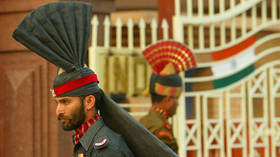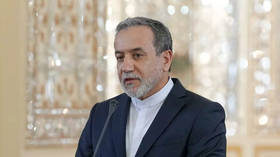Gaza economy suffocates under blockade
Four years on, Gazans are still facing the fallout from an election that saw Hamas come to victory. Since then, Gaza has been under an Israeli blockade that makes it almost impossible for goods to travel in and out.
Once, most products sold in Gaza came from Israel and a fair number of flowers, olives and fruit traveled in the opposite direction. Today the country’s economy has dwindled to almost nothing.
For the past decade, the Palestine Trade Center (PalTrade) has been helping private companies interested in exporting to Gaza. But its CEO, Maher Hamdan, says the biggest problem they face is getting in and out.
“Gaza businesses cannot export anything today – maybe with the exception of flower shipments or something. Imports are limited to a certain number of humanitarian items and goods – I think 54 in total – and this has impacted basically the industrial sector, the agricultural sector, as well as the construction sector, tremendously,” Maher Hamdan says.
The Israeli army left Gaza in 2005 but it is still very much there. Soldiers control the borders – effectively controlling Gaza.
An Israeli company is also responsible for supplying the entire Strip’s fuel, giving Israel a very important bargaining tool, which it has used in the past.
Israeli activists say Israel also benefits economically from the siege. All companies bringing goods into Gaza pay taxes in Israel.
“All of the aid that comes into Gaza has to come through Israel, and much of it is bought in Israel. It is something that Israel does not admit, but there is an economic interest for them to have Gazans depend on international aid,” says Merav Amir, a research coordinator for the Whoprofits project.
Israel justifies the lengthy border procedures for security reasons. They argue that Hamas poses a real threat to the security of the country – and by making life almost unbearable for ordinary Gazans, Israelis are also hoping that Hamas loses support.
Yousef Abu Eida’s business has been deteriorating rapidly – last year’s war almost finished him off.
“I keep wondering what our fault was and why they did it to us, innocent people and factory owners. We have purely commercial ties with our Israeli partners, with Israeli citizens. So, it turns out that this was our only fault. This is why they destroyed this plant and other plants too,” businessman Yousef Abu Eida, who lost millions of dollars in the last war, says.
At the best of times, the Palestinian economy is only about six or seven per cent the size of Israel’s. Right now it has decreased to three per cent.
But in stark contrast to the economy in Gaza, the standard of living of Palestinians in the West Bank has been steadily climbing.
Professor of Economics at Hebrew University, Ephriam Kleiman, says it is a direct result of the different governments – politicians in the West Bank recognize Israel and in Gaza they do not.
“Gaza had a war and was under siege ever since the Hamas government came into power as part of an attempt to dislocate it by making the life of people rather miserable and telling them that being governed by Hamas is not a good deal, while in the West Bank, on the contrary, there is a government that is ready to cooperate,” explains Ephriam Kleiman.
A UN commission has called Israel’s and Egypt’s blockade of Gaza a war crime and possibly a crime against humanity. It has recommended the matter be referred to the International Criminal Court unless the situation soon improves in the region, where over 80 per cent of people remain below the poverty line.
In recent months, Israel has been easing restrictions in and out of Gaza. But with no political solution in sight, many feel these sweeteners do little to remove the bitter reality.












